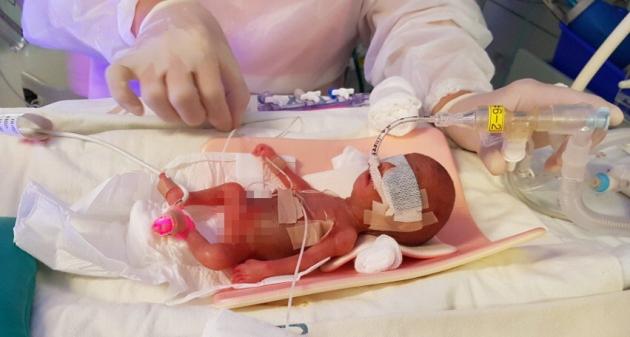
Asan Medical Center (AMC) said it has discharged Lee Sa-rang, Korea’s smallest baby, after nearly six months of intensive care.
Sa-rang, born on Jan. 25, was the smallest baby to be born in Korea. She weighed 302 grams and was 21.5 centimeters tall and had premature lungs. Experts at the hospital predicted that she had less than 1 percent chance of surviving.
After Sa-rang spent the next few months at a neonatal intensive care unit, however, she miraculously recovered to full health and was allowed to leave the hospital with her parents.
The survival of premature infants weighing less than 400 grams is rare worldwide. Sa-rang will become the 26th smallest baby in the world to recover to full health among the 201 premature babies enrolled in the University of Iowa’s ultra-premature babies (less than 400 grams) site.
Premature babies who weigh less than a kilogram have underdeveloped organs and face various complications that pose life-threatening risks. The length of a needle used for any form of treatment is similar to the length of the forearm of the baby making insertion difficult. Also, any blood work is hard to obtain as a few drops of blood can cause anemia and even if surgery is inevitable, the babies are too small to operate.
Because of such circumstances, premature infants cannot receive help from medical equipment such as catapults or cardiopulmonary aids and are dependent on the experiences of the medical professionals who treat them.
Sa-rang had similar complications as she was born after only 24 weeks, which had left her with incomplete alveoli. Doctors only managed to save her after giving her CPR.
A week after her birth, Sa-rang went through another life and death moment as her weight went below 300 grams. The hospital was on high alert as there have been only a few cases where premature babies that weigh less than 300 grams survived.
Her parents made enormous efforts to bring her back to full health.
After the doctors recommended breast milk to prevent Sa-rang from getting necrotizing enterocolitis, an illness that stops the bowels from functioning, Lee In-seon, Sa-rang’s mother, immediately started producing breast milk every day despite her condition and Lee Chung-gu, her father, fed her the milk daily.
With her parent’s devotion, Sa-rang managed to recover her health, and her weight increased to 600 grams. She weighed three kilograms when she left the hospital.
According to the hospital, about 3,000 premature babies, weighing less than 1.5 kilograms, are born in Korea every year. The number is three times higher when compared to the premature births 20 years ago.
In the past three years, 163 extremely premature babies - weighing less than 500 grams - were born in Korea. However, their survival rate has also increased continuously and has reached 28 percent.
AMC has also seen 33 extremely premature babies in the past five years, with 52 percent of these premature infants surviving.
“In recent years, the domestic fertility rate has been declining, but the birth rate of a premature infant is rising due to maternal aging and the increase of artificial pregnancy,” said Professor Lee Byung-sup, the head of the infant department at the hospital. “Fortunately, the development of treatment technology has also improved the success rate on treating such premature babies.”
In the treatment of premature infants with survival limitations, the love and devotion of the medical staff such as doctors and nurses are still important, however, Lee noted.
“The hospital hopes that Sa-rang’s case will open up new possibilities and hope for the treatment of premature infants in Korea,” he said.

